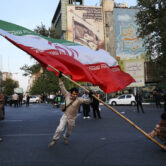(CN) — The European Court of Human Rights ruled on Tuesday that a violent incident during the 2014 Olympics amounted to “inhuman and degrading treatment” and ordered Moscow to pay members of the punk band Pussy Riot more than $100,000 in damages.
The Strasburg-based court found the attack by Cossack militia members was unprovoked and unjustified and the Russian government failed to carry out an investigation into the crime.
“The attack has been established 'beyond reasonable doubt,' and that the situation in which the applicants found themselves during the attack was not compatible with respect for their human dignity,” the seven-judge panel wrote.
During the 2014 Winter Olympics hosted in Sochi, Pussy Riot gathered about 20 miles from where events were being held for a musical performance. The Cossacks set upon the group, attacking them with whips and teargas. The incident, which lasted a few minutes, was recorded and the video was shared widely online. Russian police arrived on the scene but did not arrest the attackers.
The Cossacks — an East Slavic Orthodox Christian people who are frequently used by the Russian state to carry out law enforcement activities — were acting as an informal police force during the games. The group filed a complaint with the police but no one was ever charged.
The five victims — Nadezhda Tolokonnikova, Maria Alekhina, Pyotr Verzilov, Aleksei Nekrasov and Lusine Dzhanyan — were treated at a nearby hospital for lacerations, bruising and chemical burns.
Despite their injuries, some members of the group went on to hold a surprise performance in central Sochi, next to the Olympic rings, later that day.
Russian authorities denied they were responsible for the incident. They claimed a “scuffle” had taken place between the band and off-duty Cossacks. According to Moscow, the injuries sustained in the attack didn’t meet the threshold for “inhuman treatment” and an investigation was carried out.
The court highlighted several shortcomings of the investigation, including that Cossacks were wearing their uniforms during the attack, several told the police that they were on duty and the Russian police failed to intervene. “The authorities failed to carry out an effective investigation capable of leading to the identification and punishment of those responsible,” the judges wrote.
It isn’t the first time the ECHR has sided with the punk group. In 2018, the court found the Russian government mistreated the group when it imprisoned them after a highly publicized and unauthorized performance inside a Moscow cathedral six years earlier. Moscow announced in 2019 that it paid the musicians $41,000 as part of the decision.
In Tuesday’s decision, judges ordered Russia to pay each of the five victims about $24,000 in damages.
However, it is unlikely that the band will see any of the damages awarded in this case. The Council of Europe — the body that oversees the court — expelled Russia in 2022 over the invasion of Ukraine. Proceedings brought before Russia's official departure in September 2022 could continue, under the court’s rules, but the Council of Europe has had no contact with Moscow since its expulsion.
A number of other decisions, including an order to pay $143 million to Georgia for civilian killings, torture and looting during the 2008 Russo-Georgian War, have not been implemented.
Subscribe to Closing Arguments
Sign up for new weekly newsletter Closing Arguments to get the latest about ongoing trials, major litigation and hot cases and rulings in courthouses around the U.S. and the world.









